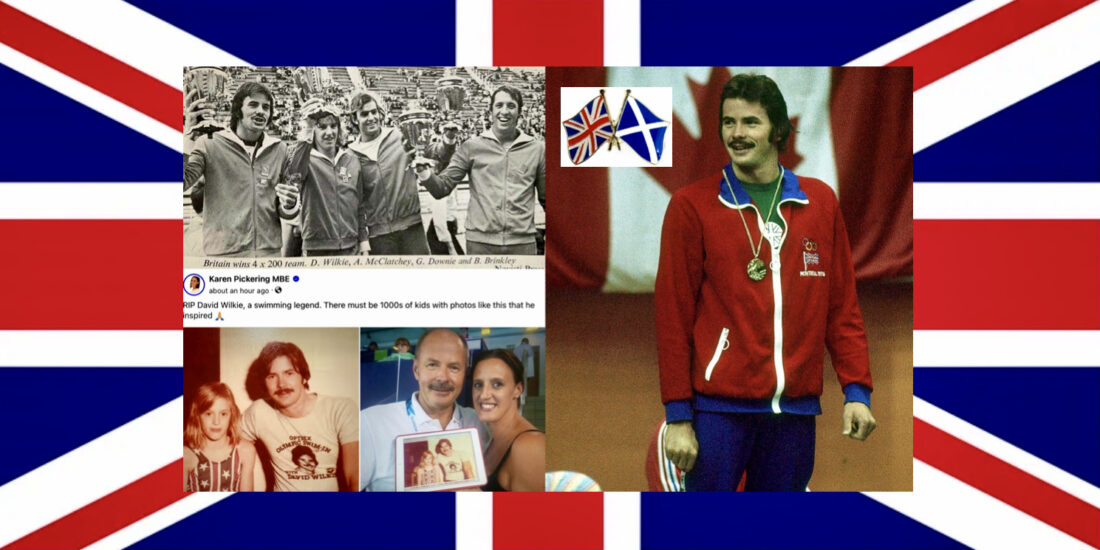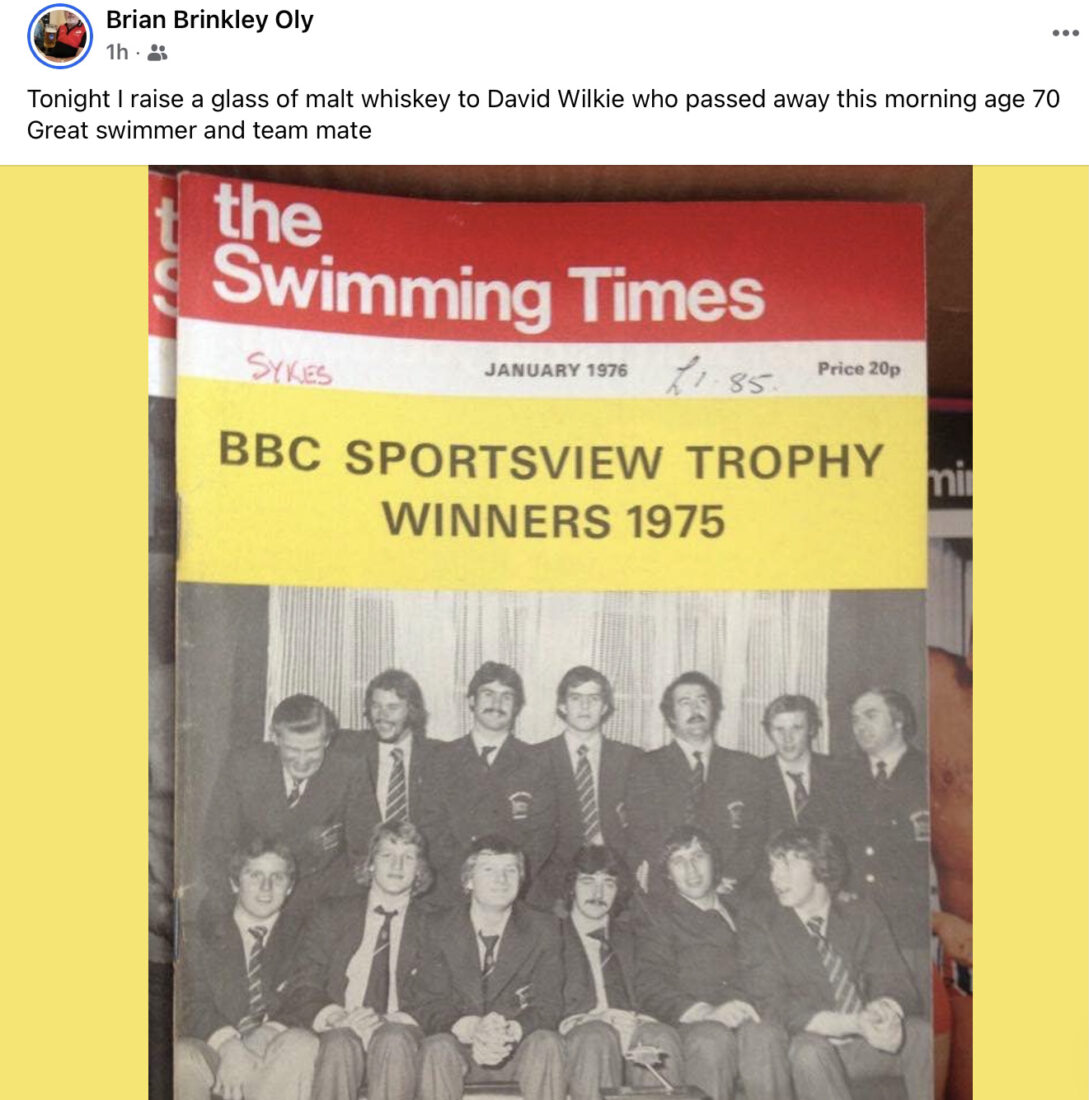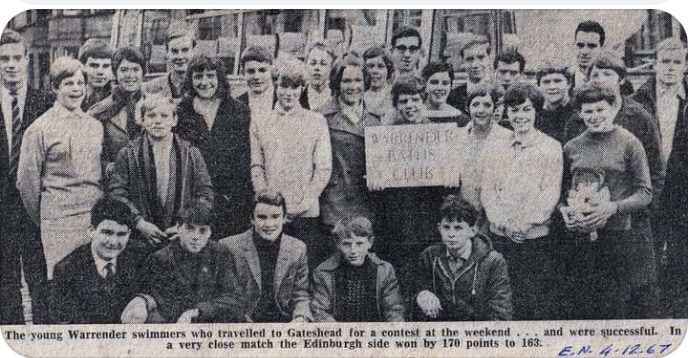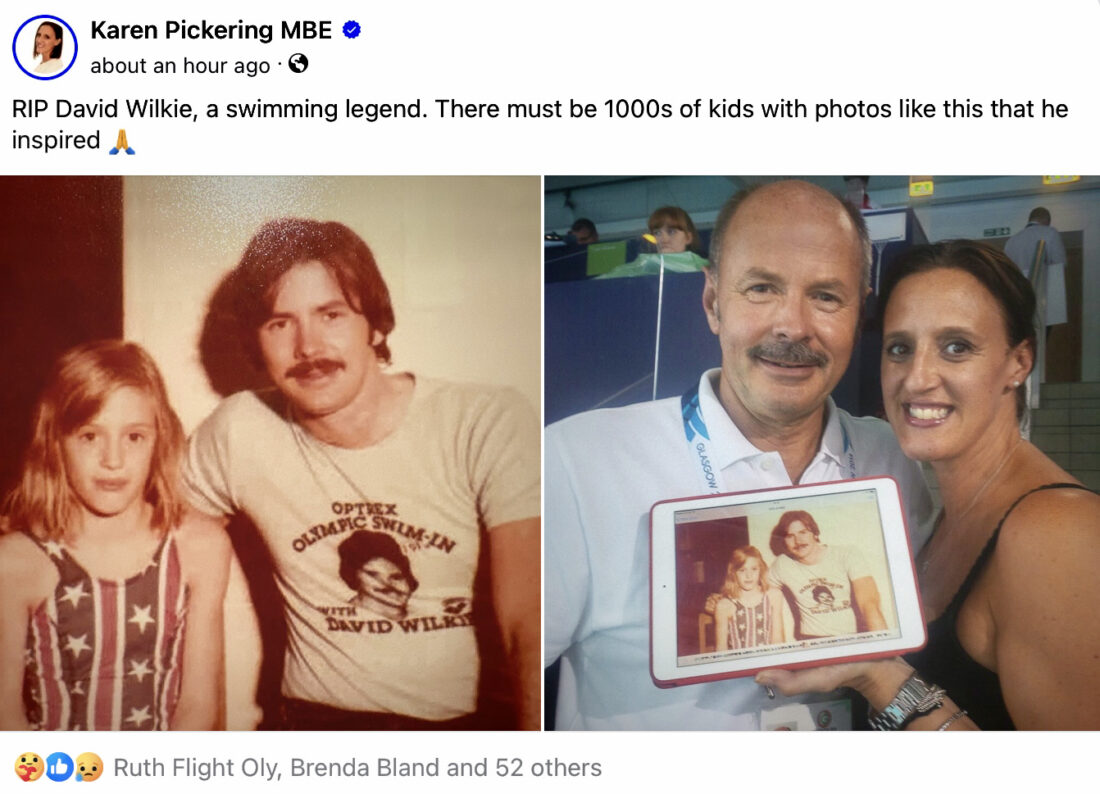David Wilkie MBE (1954 – 2024) – Legend Passes, His Legacy In & Out Of The Pool Lives On

Between Henry Taylor in 1908 and Adam Peaty in 2021, the “best swimmer Britain ever had” was David Wilkie.
Many fond memories of the man and his achievements flooded back when I heard of David’s passing much earlier today just a couple of months after he’d celebrated his 70th birthday in the midst of a battle with cancer.
In the pool, his pioneering punch in the 200m breaststroke as the only non-American winner of a men’s Olympic title at the Montreal 1976 Games will forever be the measure of the man’s sporting immortality. His kindness, gentle manner and popularity with his teammates are also hallmarks of his legacy.
A few tributes that sum up so many more, among them in many varieties “when we were kids, we wanted to swim like David Wilkie”:

Brian Brinkley: Sadly I heard today of the passing of David Wilkie, a true Olympian. I have used an old photograph showing David in an 800 free relay (75 in Moscow) Euro Cup. He was my team mate from 1971 to 1976 and friend for ever and will be sadly missed by all those who knew him
Leigh Atkinson: Tragic news that my all time sporting hero, David Wilkie, has sadly passed away. Dave was my inspiration, with his 200 Breaststroke Gold medal and world record of 2:15.11, in Montreal 1976 still being the best individual swim by a British swimmer in history. Dave will be missed by so many people within the world of swimming. Love and condolences to Dave’s family and friends at this very side time
Doug Campbell: I’m in total shock. A great swimmer, person and role model to millions of young swimmers in the 70’s & 80’s
Sharron Davies: I am so sad to hear of the loss of Olympic champion superstar breaststroker – my first crush & definitely an inspiration – proud Scotsman David Wilkie who died earlier today, sleep tight old friend x
Michael Peyrebrune: David was very friendly and a cool, smooth gent. Unsurprising that he was such a success in business and stood up for performance swimming. I enjoyed swimming in relays with him during his comeback in the late ‘80s. He was groundbreaking as a swimmer in breaststroke and medley.
Scottish Swimming/Ian Wright: Scottish Swimming is very saddened to hear of the passing of David Wilkie, following a courageous battle with cancer. The Olympic, World and Commonwealth gold medallist was 70 years old.
Speaking at the news of his passing, Scottish Swimming’s National Coach, Ian Wright, said:
“David was one of the most outstanding trailblazers for swimming in Scotland. His world record gold medal winning swim at the 1976 Olympics still stands as one of the greatest performances of all time. His path to medal success, through a Scottish Club, continues to inspire our athletes and I sincerely hope his family takes great comfort from the continued success of our sport and the part David played in that.”
Read the Scottish Swimming tribute, with pictures from Peter Heatly, who writes:
It was so sad to hear the news yesterday that David Wilkie, our friend of around 57 years, teammate, and sporting hero had passed away at the age of 70. David was a pleasure to know and we had many years of fun at Warrender and other swimming pools and events. After training with David for many years, normally a good few yards behind him, it was an extraordinary day when Sue and I were in Montreal in 1976 to see David win the 200 metres breaststroke in a world record at the Olympic Games. We send our condolences to David’s family. David, you were exceptional. RIP. Sleep tight old friend. This is a newspaper cutting of Warrender in Edinburgh leaving for a contest at Gateshead in 1967. Sue and I are in the Team and the future superstar is on the right-hand side in the front row:

Peter Scott: Very sad to hear this. Condolences to all David’s family and friends. David was a big influence in my swimming career. His win in the 200m Breaststroke in the Montreal Olympics was amazing: I still watch this race on you tube.
David went to the same school as me in Edinburgh and was 6 years older than me. He visited us after his win in Montreal and I remember holding his gold medal with its chain and wooden box. This inspired me to this very day and I am still competing at 63 years old. My favourite event? The 200m Breaststroke of course. Rest in peace my friend and thank you for the glorious memories 🙏
And in The Times, Scotland – my tribute
David Wilkie – When ‘Dominance’ Didn’t Do Justice To His Majestic Swim In Montreal
David Wilkie’s skill and speed were beyond their time, his golden moment one that stands tall not only in the pantheon of British swimmers but in the hall reserved for the greatest performances in his sport in the ultimate aquatic arena. Dominant doesn’t do justice to a swim that wiped three seconds off the world record in a time that would still have ranked among the best three in Britain 30 years on.
He set three world records in his time, twice the 200m breaststroke and once the 200m medley, his 2:06.32 securing the European title in 1974, his versatility one of several pioneering lines in his career. There was no 200IM for men at Montreal 1976, the event having been removed from the program before reinstatement in 1980. Had it not been for that, Wilkie would have had a fine shot at double gold.
In 1977 he was appointed MBE in Her Majesty Queen Elizabeth II‘s Honours.
A couple of David Wilkie’s lengthier last interviews:
2017: BBC Sport – My Story: David Wilkie
2020: This Sporting Life – BBC Radio
Before the swift swims, a few memories of mine:
Sharron Davies once told me, when looking back to a time when she was 13 and racing at her first Games in Montreal: “David was just a lovely bloke. I had a massive crush on him the minute I met him. I think every girl on the team did – and probably lots of others, too.”
Dashing looks went hand in hand with the things that last longer: calm, gentle giant, easy going, none-friendlier, cool, smooth, a true gentleman, humble, great company. Those are just a few of the kind words ebbing from Scotland, Britain and club teammates as the sad news of David’s passing a couple of months after he celebrated his 70th birthday flowed.
Born in Sri Lanka the offspring of Scottish parents who were stationed there, he lived in Aberdeen as a boy when the family returned home. Which leads me to my fourth memory of David.
I trained in Bon Accord Baths in the Granite City and most mornings there was a doctor who would do a few laps the other side of the lane rope when we were slogging up and down for 6 or more kilometres at 6am. There were many days when the doctor wrote a stinging letter to Aberdeen City Council complaining that the swim squad was taking up too much space in the pool, though he had a few lanes to himself most mornings. The likes of Olympic medallist-to-be Neil Cochran was among those pumping out the lengths and honing skills. The chap was unimpressed.
When my dad and coach asked who he was, the council sent him a copy of a letter submitted a decade or so earlier: the same man had bemoaned the presence of a boy “with a lane all to himself … what a ludicrous waste of space”, especially because “it was obvious he was never going to make it”.
That visiting boy was David Wilkie.
He first came to the public’s attention when he won bronze in front of his home crowd at the 1970 Commonwealth Games in Edinburgh in the 200 metre breaststroke. David wore a swim cap at those home Games, making him the first elite swimmer to wear one in a major competition (though vintage shots of Japanese swimmers suggest there may be a touch of nothing under the sun about a fair few lane lines stating X and Y were first when that may not have been quite the case…).
For his 1970 success, the Scottish Amateur Swimming Association awarded Wilkie the Nancy Riach Memorial Medal Award (for biggest achiever) and the W.G. Todd Cup and Prize (for best junior). It was the first time ithat both awards had gone to the same person in the same year.
Later, David Wilkie added another tech-pioneering line to his biography to become the first to wear cap and goggles together in competition. It wasn’t a fashion statement. The silicon copy of Peaty’s head used in a laboratory on the way to Olympic glory to work out the most efficient angle of entry into the water at each drive of legs would not be around for some decades but the principle was the same: Wilkie’s cap-and-goggles were aimed at improving his streamlining and efficiency in and through the water on a stroke more resistant in a heavy element than all the others.
Wilkie woke the world up with Olympic silver in the 200m breaststroke at the Munich Games in 1972, which came as a surprise to some: he’d acquired “a reputation for avoiding hard work and not being sufficiently committed”, as his coach Dave Haller once said. He would later tell me that Wilkie knew himself well and was “taking his own time and developing at his own pace.”
Wilkie recalled Munich for other reasons: “It was the massacre of the Israeli athletes and I’ll never forget it,” he told the BBC’s This Sporting Life in 2020. “We’d finished our events and we were out having beers and got back to the village quite late – about two or three in the morning. Our digs were right on the perimeter and we saw these guys in yellow tracksuits coming over the fence.
“We didn’t have any suspicions. Getting in and out of the village was easy, there was no security, we’d get fake passes for friends, it was as easy as that. Next day we came down for breakfast and the Canadian swimmers said, ‘Have you heard?’ We said, ‘Heard what?’
“On a terrace near where we were sitting we could see these Palestinian guys with masks and guns and the German police. It was right there in front of us. A breaking news story in front of our eyes. Horrific. I was 18. I didn’t see any shooting but you grow up pretty quickly after seeing something like that.”
After Munich, Wilkie was offered scholarships by Harvard University, the University of Southern California, Florida, Alabama and Miami. He went for the latter.
Wilkie took the world title over 200m breaststroke in a world record and a bronze over 200m medley at the inaugural championships at Belgrade in 1973. His victory immortalised his status as the first British swimmer ever to claim a World title. In Cali two years later, he became the first man to claim the 100 and 200m breaststroke double, and claimed bronze as a member of Britain’s 4x100m medley quartet.
That 1975 haul led to him being voted British Sports Personality of the Year.
Some seasons on, natural ability held hands with intensive training at the University of Miami, where, suitably, oceanography was on David’s reading list.
Bill Diaz coached him in the U.S. on the way to Wilkie’s greatest moment, Olympic victory over 200m breaststroke in 2:15.11, against the pre-race mark of 2:18.21 and a world ahead of a breaststroke great in his own right, John Hencken of the US, also well inside world-record pace but back on 2:17.26.
Wilkie’s was a Beamonesque effort, one that made him the first British man to win Olympic swimming gold since Henry Taylor in London 1908.
In Montreal, he gatecrashed the American party in the pool – the USA men won every other gold barring Wilkie’s win in the 200m breaststroke.
His last length sprint to glory remains one of the most memorable swims in
history. In the last 25m to the wall, he left American favourite John Hencken looking as though he was trading water. The World record was left gasping for air 3.1 seconds back in history. I recall watching the race on the television, jumping for joy and celebrating as though David Wilkie’s gold was ours. And it was. It’s how inspiration works:

My dad was a coach at those Games and came home to tell us that of all the many memories he would treasure, David’s swim topped the lot.
When Elton John Met David Wilkie On The King’s Road
“I was 22 in Montreal in 1976,” Wilkie told the BBC in 2020. “Hencken beat me in the 100m breaststroke final and he did it in a world record time.
“The 200m breaststroke was my strongest event. I couldn’t believe how nervous I was in the heats. The pressure on me was all internal, but I qualified fastest and the confidence was brimming. I was ready and I put together probably the best race of my life.
“I broke the world record by three seconds and that was life-changing because now I have agents wanting to represent me. I’m on radio with Terry Wogan and 10 million listeners. I became a personality.
“I was walking down the King’s Road with some friends from America one day and Elton appears and says, ‘Hi David…’ and my friends couldn’t believe I knew Elton John.”
Beyond The Pool
David went on to develop a successful green health and cosmetics products company, and developed swimming equipment along the way. He lived most of his adult life in Southern England, though at the Glasgow 2014 Commonwealths, he told me his heart would always have a place for Scotland “no matter where I roam”.
In 2010, David Wilkie was inducted into the Scottish Swimming Hall of Fame as one of the first in that pantheon after its foundation.
In a BBC Scotland interview in 2020, he confirmed he still swam every day in his pool at home in the south of England and on one trip to his local pool got told off for “swimming too fast”.
A man who will be much missed by all who knew him, David’s memory will roam forever in the Olympic pool.
As his Britain Olympic teammate Brian Brinkley put it: “Tonight I raise a glass of malt whiskey to David Wilkie who passed away this morning age 70. Great swimmer and teammate.”
Sincere condolences to his wife Helen, and children Natasha and Adam.
RIP David Wilkie.